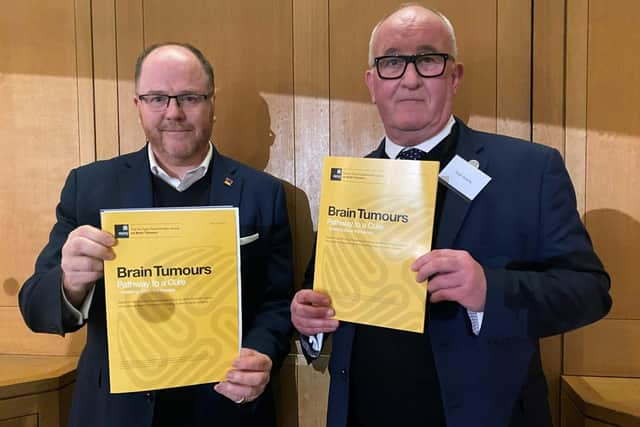Northamptonshire brain tumour widow welcomes report demanding action
and live on Freeview channel 276
A Northamptonshire brain tumour widow has welcomed a new report demanding urgent action to help those affected by the devastating disease
The All-Party Parliamentary Group on Brain Tumours (APPBGT), for which Milton Keynes-based charity Brain Tumour Research provides the secretariat, calls for wide-ranging changes to be made in how research into the disease is funded in its latest Inquiry Report Pathway to a Cure – Breaking Down the Barriers.
Advertisement
Hide AdAdvertisement
Hide AdIt calls out the current funding system as unfit for purpose and claims patients and families continue to be let down despite the promise of millions of pounds of investment which has not materialised. It raises issues in the treatment of terminally ill children denied access to last resort clinical trials despite their parents’ wishes.


The report, published Tuesday (28 February) on the eve of national Brain Tumour Awareness Month, was launched at a Westminster reception jointly hosted by Brain Tumour Research and the Tessa Jowell Brain Cancer Mission which launched a separate report giving extensive insights into NHS brain cancer services, highlighting significant geographic variations.
The APPG report also highlights a so-called “valley of death” in which potential new treatments discovered in the laboratory fail to reach patients because of unnecessary complexity in the way research is funded.
Jade Payne, from Brackley, is among patients, their families, charities, and scientists who have welcomed the report.
Advertisement
Hide AdAdvertisement
Hide AdHer husband, Daniel, was diagnosed with an incurable grade 2 astrocytoma at the age of 22 in 2006. He had a 13-year-long battle with the disease but after his tumour progressed to a grade 4 glioblastoma (GBM) and he lost control of his body, ultimately he decided he did not want to continue with treatment. He died in December 2019, aged 35.
Jade, who works as a nanny, said: “Watching my husband suffer the way he did towards the end of his life was the most traumatic experience for me, his family and, most importantly, for him. He became a shell of himself and lost more than just his physical abilities.
“Before his tumour became grade 4, he tried applying for medical trials and alternative treatment to no avail. He didn't want to die the way he did, he wasn't ready to die and still had so much to live for yet there were no other treatment options before his tumour took hold. The bravest decision he made was to stop treatment altogether.
“The same treatments have been used for decades and other countries are more advanced than the UK, but not everyone diagnosed with a brain tumour can go abroad for treatment.”
Advertisement
Hide AdAdvertisement
Hide AdShe added: “The statistics on brain tumours speak for themselves. They kill more children and adults under 40 than any other cancer. How many more have to die from a brain tumour before the funding promised is given? How many more families have to watch their loved ones go through this horrific ordeal, have their lives ripped apart and suffer heartbreak before more can be done to change the statistics?”
Key recommendations of the inquiry include:
● The Government should recognise brain tumour research as a critical priority, ring fencing £110 million of current and new funding
● The research funding system has been built in silos and needs to be joined up from basic science through to clinical trials. Patients with brain tumours should have equity of access to trials of new anti-cancer drugs
● Funding bodies should ring-fence specific funding for research into childhood brain tumours where survival rates for the most aggressive tumours have remained unchanged for decades leading to frustrated families seeking costly and unproven treatment abroad
Advertisement
Hide AdAdvertisement
Hide AdDerek Thomas MP, who chairs the APPGBT, said: “A total of £40 million in investment has been promised since 2018*. This gave cause for optimism and heralded a very welcome shift in focus especially considering the historic underfunding of research into brain tumours which has received just 1% of the national spend on cancer research since records began.
“However, our investigations have revealed a concerning lack of deployment of these funds with just £15 million reaching the hands of researchers in the five years since it was promised.
“We are hearing that the current system is too complicated, it doesn’t connect laboratory work with what is happening in clinics, that there is no up to date and robust database for people to understand if they could be eligible for clinical trials and that far too little of the money previously promised has reached the hands of the researchers who can make a difference.
“The sad fact is that brain tumour patients do not have the luxury of time. The Government must act now in order to recognise brain tumour research as a critical priority, appoint a champion, and ringfence sufficient funds to make a difference.”
Advertisement
Hide AdAdvertisement
Hide AdSue Farrington Smith MBE, the Padbury-based chief executive of Brain Tumour Research, said: “Brain tumours are a uniquely complex disease, and we must recognise this with a unique response.
“Survival rates for brain tumour patients have remained unchanged over recent decades and, despite improvements in neurosurgical techniques, supporting care, and more refined imaging and molecular diagnostics, we are yet to see the upward trajectory of other malignant diseases such as breast cancer and leukaemia.”
Brain tumours kill more children and adults under the age of 40 than any other cancer, yet, historically, just 1% of the national spend on cancer research has been allocated to this devastating disease
Brain Tumour Research funds sustainable research at dedicated centres in the UK. It also campaigns for the Government and the larger cancer charities to invest more in research into brain tumours in order to speed up new treatments for patients and, ultimately, to find a cure.
To read the report in full, go to www.braintumourresearch.org/appgbt-briefing-pathway-2023.